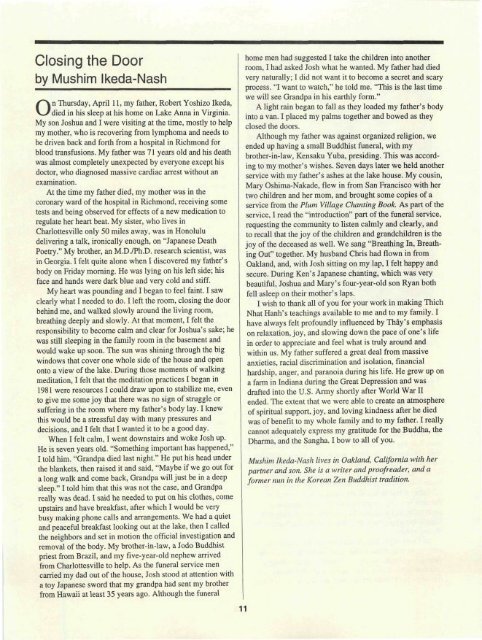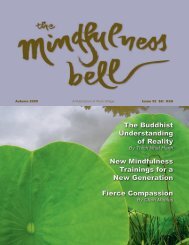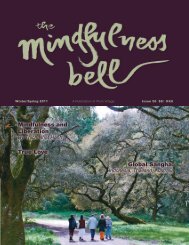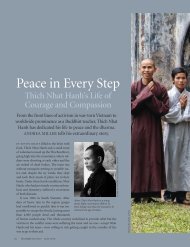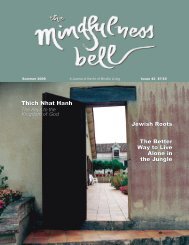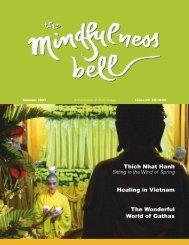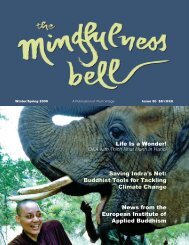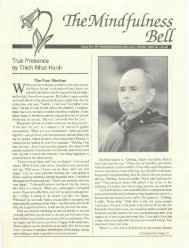The Practice of Prayer byThich Nhat Hanh - The Mindfulness Bell
The Practice of Prayer byThich Nhat Hanh - The Mindfulness Bell
The Practice of Prayer byThich Nhat Hanh - The Mindfulness Bell
Create successful ePaper yourself
Turn your PDF publications into a flip-book with our unique Google optimized e-Paper software.
Closing the Door<br />
by MushimIkeda-Nash<br />
On Thursday, April 11, my father, Robert Yoshizo Ikeda,<br />
died in his sleep at his home on Lake Anna in Virginia.<br />
My son Joshua and I were visiting at the time, mostly to help<br />
my mother, who is recovering from lymphoma and needs to<br />
bedriven back and forth from a hospital in Richmond for<br />
blood transfusions. My father was 71 years old and his death<br />
was almost completely unexpected by everyone except his<br />
doctor, who diagnosed massive cardiac arrest without an<br />
examination.<br />
At the time my father died, my mother was in the<br />
coronary ward <strong>of</strong> the hospital in Richmond, receiving some<br />
testsand being observed for effects <strong>of</strong> a new medication to<br />
regulate her heart beat. My sister, who lives in<br />
Charlottesville only 50miles away, was in Honolulu<br />
delivering a talk, ironically enough, on "Japanese Death<br />
Poetry." My brother, an M.D./Ph.D. research scientist, was<br />
in Georgia. I felt quite alone when I discovered my father's<br />
body onFriday morning. He was lying on his left side;his<br />
face and hands were dark blue and very cold and stiff.<br />
My heart was pounding and I began to feel faint. Isaw<br />
clearly what I needed to do. I left the room, closing the door<br />
behind me, and walked slowly around the living room,<br />
breathing deeply and slowly. At that moment, I felt the<br />
responsibility to become calm and clear for Joshua's sake;he<br />
was still sleeping in the family room in the basement and<br />
would wake up soon. <strong>The</strong> sun was shining through thebig<br />
windows that cover one whole side <strong>of</strong> the house and open<br />
onto a view <strong>of</strong> the lake. During those moments <strong>of</strong> walking<br />
meditation, I felt that the meditation practices I began in<br />
1981 were resources Icould draw upon to stabilize me,even<br />
to give me some joy that there was no sign <strong>of</strong> struggle or<br />
suffering in the room where my father's body lay. Iknew<br />
this would be a stressful day with many pressures and<br />
decisions, and Ifelt that I wanted it to be a good day.<br />
When Ifelt calm, I went downstairs and woke Josh up.<br />
He is seven years old. "Something important has happened,"<br />
Itold him. "Grandpa died last night." He put his head under<br />
the blankets, then raised it and said, "Maybe if we go out for<br />
along walk and come back, Grandpa will just be in a deep<br />
sleep." Itold him that this was not the case, and Grandpa<br />
really was dead. I said he needed to put on his clothes,come<br />
upstairs and have breakfast, after which Iwould be very<br />
busy making phone calls and arrangements. We had a quiet<br />
and peaceful breakfast looking out at the lake,then I called<br />
the neighbors and set in motion the <strong>of</strong>ficial investigation and<br />
removal <strong>of</strong> the body. My brother-in-law, a Jodo Buddhist<br />
priest from Brazil, and my five-year-old nephew arrived<br />
from Charlottesville to help. As the funeral service men<br />
carried my dad out <strong>of</strong> the house, Josh stood at attention with<br />
a toy Japanese sword that my grandpa had sent my brother<br />
from Hawaii at least 35 years ago. Although the funeral<br />
home men had suggested I take the children into another<br />
room, Ihad asked Josh what he wanted. My father had died<br />
very naturally; Idid not want it to become a secret and scary<br />
process. "I want to watch," he told me. "This is the last time<br />
we will see Grandpa in his earthly form."<br />
A light rain began to fall as they loaded my father's body<br />
into a van. I placed my palms together and bowed as they<br />
closed the doors.<br />
Although my father was against organized religion, we<br />
ended up having a small Buddhist funeral, with my<br />
brother-in-law, Kensaku Yuba, presiding. This was according<br />
to my mother's wishes. Seven days later we held another<br />
service with my father's ashes at the lake house. My cousin,<br />
Mary Oshima-Nakade, flew in from San Francisco with her<br />
two children and her mom, and brought some copies <strong>of</strong> a<br />
service from the Plum Village Chanting Book. As part <strong>of</strong> the<br />
service, Iread the "introduction" part <strong>of</strong> the funeral service,<br />
requesting the community to listen calmly and clearly, and<br />
to recall that the joy <strong>of</strong> the children and grandchildren is the<br />
joy <strong>of</strong> the deceased as well. We sang "Breathing In, Breathing<br />
Out" together. My husband Chris had flown in from<br />
Oakland, and, with Josh sitting on my lap, I felt happy and<br />
secure. During Ken's Japanese chanting, which was very<br />
beautiful, Joshua and Mary's four-year-old son Ryan both<br />
fell asleep on their mother's laps.<br />
I wish to thank all <strong>of</strong> you for your work in making Thich<br />
<strong>Nhat</strong> <strong>Hanh</strong>'s teachings available to me and to my family. I<br />
have always felt pr<strong>of</strong>oundly influenced by Thay's emphasis<br />
on relaxation, joy, and slowing down the pace <strong>of</strong> one's life<br />
in order to appreciate and feel what is truly around and<br />
within us.My father suffered a great deal from massive<br />
anxieties, racial discrimination and isolation, financial<br />
hardship, anger, and paranoia during his life. He grew up on<br />
a farm in Indiana during the Great Depression and was<br />
drafted into the U.S. Army shortly after World War II<br />
ended. <strong>The</strong> extent that we were able to create an atmosphere<br />
<strong>of</strong> spiritual support, joy, and loving kindness after he died<br />
was <strong>of</strong> benefit to my whole family and to my father. I really<br />
cannot adequately express my gratitude for the Buddha, the<br />
Dharma, and the Sangha. Ibow to all <strong>of</strong> you.<br />
Mushim Ikeda-Nash lives in Oakland, California with her<br />
partner and son. She is a writer and pro<strong>of</strong>reader, and a<br />
former nun in the Korean Zen Buddhist tradition.<br />
11


